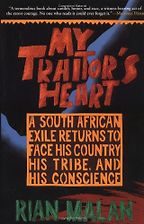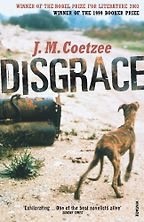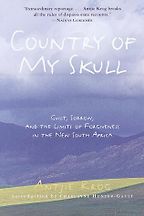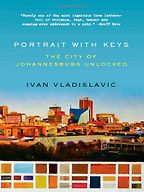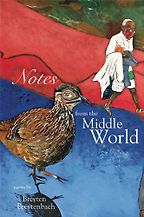Tell me about your first choice, My Traitor’s Heart by Rian Malan.
Rian Malan wrote this in the late 80s. He left South Africa, as he refused to be conscripted into the armed forces of the apartheid regime, and he went to live in the United States. He left as a crime reporter for The Star, which is a Johannesburg daily, and when he was in the US he became a narrative journalist and ended up a contributing editor for Rolling Stone magazine. While he was in America he decided he was going to go back to South Africa and write the story of the Malans.
“My Traitor’s Heart is perhaps the most important memoir that has ever been published by a white South African.”
They are a very old Afrikaner family stretching right back to around 1687, I think, which was 35 years after Jan van Riebeeck landed at the Cape. There was a Malan at every great historical event in the ensuing 320 years. Rian was commissioned by Random House to go and write the story of the history of his clan, but he realised 100 pages in that the story was actually a memoir and it was about his struggle. Because, when he looked at the Malan family all the way up to his Great Uncle Daniel François Malan, who was the first apartheid era prime minister, I suppose he understood that the real story was about his own identity as a white South African.
His father was Afrikaner and his mother is English-speaking, so he straddles two worlds in the memoir. He decided to tell the story of South Africa by describing how South Africans go about killing each other, and so he visited scenes of bloodshed and murder across the country.
You are interested in the whole issue of white identity, which is very much part of your book – so how did Malan’s book help you?
My Traitor’s Heart is perhaps the most important memoir that has ever been published by a white South African. When I read it for the first time in 2005, before my cousin was murdered, it had a profound effect on me. Here was a man whose identity is very close to mine, who stared into the irreconcilable inner turmoils that are implicit in being a white South African. I subsequently became friendly with Rian and he became a mentor.
Your next book is Disgrace by J M Coetzee.
This book was written in the late 90s and although it is very difficult – especially with writers like J M Coetzee – to link the work to the man, my personal reading of the book is that it is a work of profound disappointment and sadness. It is all about a fifty-something professor, David Lurie, who teaches at a Cape Town university. He has an affair with a young student – Melanie. He gets hauled before a disciplinary panel and refuses to defend himself.
He doesn’t see why he should submit to a jury of his peers, who are as compromised, if not more compromised, than he is. He views the whole thing as a farce, and he goes off to live with his daughter Lucy on a farm in the Eastern Cape – which is a beautiful part of the country, and Coetzee’s descriptions of it are second-to-none. What happens here is a rape.
Lucy gets raped by a group of black men who break into the farmhouse. And David gets beaten and tied up in the bathroom and, ultimately, this is symbolic of his powerlessness over these sorts of events and eventually over history. What Coetzee is basically saying is that South Africa is the bastard child of an interracial rape. And it is a very powerful metaphor for what the country is.
Now the reaction to the book in South Africa was vicious. Coetzee was censured in parliament. Thabo Mbeki spoke out against the book in a public forum. One of Mbeki’s major issues when he was president, and I think it still remains, is this image of a black man as promiscuous and unhinged, and Disgrace did portray that. But I think what the ANC didn’t get was how the book was also portraying white culpability in that entire metaphor. It is an act of revenge for a rape that is perpetrated over 350 years.
Coetzee no longer lives in South Africa. Although he will never confirm or deny this, it is my reading that the reaction to Disgrace from the ANC had quite a bit to do with him leaving South Africa for Adelaide.
Your next book, Antjie Krog’s Country of My Skull, is all about South Africa’s Truth and Reconciliation Commission.
This is an astounding work of nonfiction. Antjie is one of South Africa’s most important Afrikaans poets. This was her first full book-length work of English prose. She worked as a journalist for the South African Broadcasting Corporation at the Truth and Reconciliation Commission, and she went around the country listening to testimony of victims of apartheid and families of people who had been killed by the apartheid security police. And this book is critical for an understanding of South Africa.
She takes you into the raw emotion that exists in South African to this day. And in terms of the emotional aspect, in terms of the feelings, the blood, the open wounds, the heartache and hope and hopelessness she expresses, she does it better than anyone else. She does pepper the book with her own reasons for staying committed to South Africa.
Do you agree with her that there was a lack of hope during that process?
I think the Truth and Reconciliation Commission was painted in this book as a failure. I think that it was a very noble effort and the world is still learning from what happened there. I see it as a failure, though, in the sense that white South Africa didn’t embrace it at all. And they still haven’t embraced it. At the time the Afrikaans newspapers were all saying, ‘Don’t blame us, we refuse to be guilty’.
“She takes you into the raw emotion that exists in South African to this day.”
There was a sort of acknowledgement in the English press, but what they were really doing was pointing at the Afrikaners, which English liberal South Africa has been doing for ever. So there is still this in-fighting among the white community today, rather than a collective acknowledgement about what they are responsible for.
Your next book is all about Johannesburg – Ivan Vladislavic’s Portrait with Keys.
I think that Ivan Vladislavic is probably our most unheralded writer. It is my personal belief that since J M Coetzee left for Australia, Ivan is the best craftsman living and working in South Africa today. He is an astoundingly accomplished master of the English sentence. This book is his first work of nonfiction.
The book is a series of 138 fragments, each dealing with a specific symbol of Johannesburg, like our keys and our walls. The key is a very symbolic Johannesburg object because we are determined to lock up our stuff. We all walk about with a lot of keys, and Ivan homes in on that. But for me the most important thing that he focuses on is the walls. Through the 138 fragments, I think there are 19 or 20 that look at the subject. He explains to people how the Johannesburg psyche is totally embodied in the height of the walls. And he does it in a very subtle, suggestive and ultimately powerful way. He will talk about barbed wire on top of the wall above the metal spikes. He will talk about the electric fencing and how walls seem to get higher as the city becomes more inward looking. There is no street culture in the affluent parts of South Africa, there is no eye contact.
Ivan is perhaps suggesting that people might want to knock down their walls, look on to the streets and try to take the first step towards mutual trust. You can do that by knocking down your walls, which we don’t.
Your final book is Notes from the Middle World by Breyten Breytenbach
I had a profound problem with this book, which I will come to in a moment. Breyten Breytenback is another one of our most esteemed Afrikaans poets. His most celebrated work of English prose is The True Confessions of an Albino Terrorist, which was a memoir about his seven years in prison.
He was part of a group of dissident Afrikaans writers formed in the 60s; another famous member was Andre Brink. Breytenbach went to live in France because he couldn’t justify a life under the apartheid state. He married a Vietnamese woman and when he came back to South Africa with her to give a talk he was thrown into prison on a trumped-up charge. When he got out of prison he went straight back to France and he has sort of remained there.
If you look at his biographies and certain websites it says he divides his time between France and South Africa, but I think he is mainly in France. Of course you can’t dismiss Breyten Breyetenbach just because he criticises South Africa from afar – I mean, he did languish for seven years in an apartheid prison, which is the ultimate sacrifice. But my major issue with Notes from the Middle World is this concept of ‘unbelonging’. He’s anti the idea of identity. I find his reaction so powerful in the negative that you are left feeling he is as attached to identity and home as much as anybody talking about it in the positive.
There is a specific passage in an essay that appears in this book, which is written in the form of a letter to Mandela. One passage goes something like: I must tell you this terrible thing, my old and revered leader: if a young South African were to ask me whether he or she should stay or leave, my bitter advice would be to go. For the foreseeable future now, if you want to live your life to the full and with some satisfaction and usefulness, and if you can stand the loss, if you can amputate yourself – then go…
Now there are two things there – the first, obviously, is the line about amputation. He is acknowledging that to leave South Africa as a South African is to amputate a limb. But what he is also saying is it is better than the amputation of the head; you can live without a limb. Fair enough, I suppose, except the problem is in the phrase ‘satisfaction and usefulness’. I mean, I personally don’t think that there are many countries that you can live in with more satisfaction and usefulness – we have every socio-economic problem you can think of, a wealth of critical issues to devote a life to. There are many people that I met when I was writing my book who are a testament to that. So I find Breytenbach’s attitude glib and offensive.
After all your research on white identity in South Africa what is your vision for that identity?
I think my generation, by which I mean 25 to 40, I think we need to acknowledge where we stand in South African society and we need to be very careful when we point to the ANC’s faults. Their faults are plenty, but we need to be very careful about how our presence in South Africa contributes to the ANC’s stance. We need to be conscious of how we behave on the streets and temper down our sense of privilege and entitlement. White South Africans have a profound sense of entitlement, it’s in-bred. We need to find our modesty, our humility in the face of our inherited and sometimes unjustified privilege.
I think if we do that then the generations that come after us will be able to negotiate their problems with a lot more ease.
June 7, 2010. Updated: June 1, 2020
Five Books aims to keep its book recommendations and interviews up to date. If you are the interviewee and would like to update your choice of books (or even just what you say about them) please email us at [email protected]
Five Books interviews are expensive to produce. If you've enjoyed this interview, please support us by donating a small amount.
